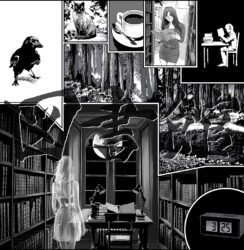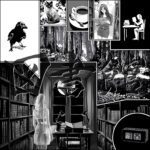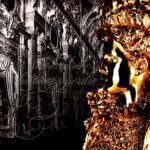Suddenly, seemingly out of nowhere, the ever-enigmatic Akira Rabelais presents two projects at the same time. Both were intended to be released in physical (vinyl) form but were canceled due to the current difficulties (and costs) of releasing vinyl, especially in multiple disc sets like these.
Akira Rabelais decided to publish them in digital form “before anything bad can happen”.
Be sure to read to the end for a chance of a free download of one of these titles!
AKIRA RABELAIS – 図書館 (TOSHOKAN – LIBRARY)
Akira Rabelais‘ work always requires an active approach from the listener, like a puzzle that must be solved. Not only when approaching his music, or reading his liner notes, or visiting his website, but even more with his software Argeiphones Lyre – the tool he uses to create his music which is free to download but takes a lot of perseverance to comprehend.
The album and track titles are presented in Japanese language without explanation.
図書館 , or Toshokan, translates to “Library”.
Google Translate also helps with the track titles: I’ll include them here so you don’t have to check them out yourself:
- 幽霊が正しい言葉かどうかはわかりませんが、それは間違いなくこの世界のものではありません
I’m not sure if ghost is the right word, but it’s definitely not of this world! - 暖かく満足のいく記憶の中で失われました
Lost in a warm and satisfying memory. - 時間は拡大し、次に縮小し、すべて心臓のかき混ぜと調和します
Time expands, then contracts, all in harmony with the heart’s stirring - 胸郭の後ろで黙って 私の暖かい心は私の意志とは無関係に伸縮します-何度も何度も
Silently behind my rib cage, my warm heart expands and contracts independently of my will – over and over again.
There’s an extensive background story to this album, based on a chapter from Murakami’s Kafka On The Shore: a story about a young boy’s experience of a ghost in his bedroom, an appearance of a beautiful young girl. No fear or horror is involved, no fearful suspense – only awe and deep fascination for the beauty and mystery of her appearance.
“As the sky begins to lighten I finally sleep a bit. When I wake up, my pillow’s cold and damp with tears. But tears for what? I have no idea.”
The music, spread out of the aforementioned four tracks each around 20 minutes in length (it was obviously intended as a double vinyl release originally) perfectly matches the atmosphere described in this story. Fleeting piano sounds, moving through misty atmospheres, present yet elusive. Unintelligible whispers from somewhere beyond. Mysterious yet comforting, never haunting, but at the same time also something we will fail to understand completely.
Music that you can easily play on repeat, again, even after listening to the full 80 minutes.
Toshokan has been a long time in making: I’m proud to have had the privilege of including a preview of this music in the DreamScenes edition of October 2020 – exactly one year ago already.
But that will probably not be the reason it may sound familiar to you. If it sounds familiar that must be because this music seems distilled from a collective subconsciousness.
It may have always been around but only now made audible through the mysterious processes of the Argeïphontes Lyre.
AKIRA RABELAIS – À LA RECHERCHE DU TEMPS PERDU 
While released simultaneously with 図書館, À La Recherche Du Temps Perdu is quite a different beast – ‘beast’ literally ánd metaphorically speaking. With a playing time of almost FIVE hours, spread over 12 tracks each around 20 minutes, and one Addenda of 57 minutes (the latter only available in the Bandcamp download), a physical release would have presented SIX vinyl albums (and one additional CD).
(Edit Dec. 02: Akira Rabelais informed me that the Recherche… album is now available as a 4-CD release also. You can find it here at Boomkat!)
“Ha, yes! the Proust books are long … and my feeling was that music from that tijdgeest (Zeitgeist) needs to be long as well”
But this is only referring to the quantity of course. The music itself is quite a surprise too.
À La Recherche Du Temps Perdu (translated as In Search Of Lost Time, or Remembrance Of Things Past) directly refers to the seven volumes of Marcel Proust‘s “recollections of childhood and experiences into adulthood in the late 19th-century and early 20th-century high-society France, while reflecting on the loss of time and lack of meaning in the world”.
Each of the album titles directly refers to the titles of the different volumes of Proust’s book.
“My aim with this album is to capture a little of that Faubourg Saint-Germain zeitgeist … what music did Proust have in his collection, what pieces did he see performed in Paris and in Venice … what was the hot shit coming out of Wien?”
Rabelais interprets the ‘remembrance of things past’ quite literally by using old recordings from the same era Proust’s novel was published (1913-1927). You’ll find music from many composers: Bartók, Bellini, Berg, Brahms, Caccini, Chausson, Chopin, Debussy, Delibes, Donizetti, Franck, Hahn, Jungmann, Lully, Ravel, Saint-Saëns, Satie, Schoenberg, Schubert, Schumann, Scriabin, Strauss, Tchaikovsky, Verdi, Wagner, and Weber (and Beethoven on the Addenda).
Many of these compositions were composed in the same period the books were written. Music from that period was often received with mixed feelings (to say the least): they were ‘met with hisses and catcalls’ or turned into a downright scandal, including fighting members of the audience.
Imagine yourself finding a large box full of old 78rpm shellac recordings in the attic of your grandparents and start listening to them. You’ll hear familiar classical music themes, including the scratches, clicks, pops, hiss, and all the other artifacts of old physical media. The lo-fi recording quality of the past immediately forces you into your own ‘search of lost times’ – times you can’t even ‘remember’ because you weren’t born yet. Listening to the music now, one hundred years later, it’s hard to imagine the scandals and unrest they caused.
But. You aren’t listening to a box of shellac recordings from your (great-)grandparents. You downloaded a massive set of supposedly new Akira Rabelais‘ music. You probably did not expect to be exposed to old-school operatic cantatas and other classical compositions, some of which sound familiar but most do not (depending on your level of knowledge of classical music). Where’s the Rabelais in all this?
At some parts, this is easy to hear. Some treatments of the sound directly resemble the way he treated the found tapes on his landmark album Spellewauerynsherde. Most of the time, subtle manipulations of the recordings are added – echo, reverb, and other inexplicable things that the Argeïphontes Lyre software can do – but always without altering the ‘soul and heart’ of the compositions involved.
At other times, the original recordings seem to be left untouched.
Only if you’re familiar with the originals you’ll notice that Akira Rabelais has “taken many liberties with the music, especially in reimagining the chamber works”.
Rabelais claims he has worked on this project for more than 10 years!
The overall effect is not unlike the The Caretaker’s way of re-creating retro dancehall music into a hallucinatory atmosphere. But here, the result is never as radically distorted as those deconstructions were: Rabelais always stays closer to the original recordings and thus to its original atmosphere. Still, he adds a new dimension to the originals, not unlike a enhancing 2D image to 3D.
I must admit it took me some time to get accustomed to this project, simply because it was radically different from what I expected. I can’t say what exactly I expected; after all, the ONE thing you can expect whenever Akira Rabelais is involved is Radical Confusion. But I certainly did not expect to open a box of old classical recordings.
But with 5 hours of playing time, there’s enough time to adjust oneself, to adjust ones expectations, and to be amazed by the subtle sonic enhancements of the original recordings.
And, undeniably: the music definitely brought back (previously non-existing) remembrances of lost times.
(Editor’s note: I usually aim Ambientblog recommendations to be short enough to raise your interest, thus avoiding long analytical reviews. But I guess whenever Proust is involved, things tend to get longer than usual. Cannot explain why, really.)
FREE DOWNLOAD CODES!?!?!
Akira Rabelais kindly contributed five download codes for each of these two releases that I can share with the readers of this blog. If you want to participate in the draw, simply leave a comment below mentioning which of the two titles you’re most interested in.
(You can’t have both, of course, sources are limited).
Winners will be drawn randomly exactly two weeks after publication.





Dream of À la recherche du temps perdu de verloren tijd komt zo wel heel dichtbij prachtig Peter thanks
Thanks for your comments.
Entries are now closed.
Winners will receive their download codes within a few days.
at this moment most interested in 図書館
Hi Peter,
The music of 図書館 is excellent. Kafka on the beach and 図書館 make a perfect match. À La Recherche Du Temps Perdu is unknown territory and sounds strangely to me so that’s the one I would like to receive to discover.
So Lovely! I am looking forward to hear more from this engaging artist.
I stumbled across Recherche today, and it’s beautiful. Album of the year – and the year is 1913…
図書館, I listen to this one in the midnight, and it seems like a moonlight ghost, it’s a pure magic.
I would love to hear 図書館.
Peter,
I’m curious to hear “A la recherche . . . ”
Thank you very much
Best regards
I’m interested in 図書館.
Thanks
I’ve been wondering when the next Akira Rabelais release would be available, and without announcement we get two! I’m more interested in À la Recherche du Temps Perdu, though I will be getting both at some point. I can’t wait to dive into these albums.
When I got a message announcing the release of both of these new recordings, I couldn’t scramble fast enough to avail myself of them. and, just as I knew, they did not disappoint. Spellbinding, like being suspended in a gaseous state for hours. Just can’t recommend them highly enough!
Ha Peter, beide albums zijn prachtig, zoals ik van Rabelais gewend ben. Ondanks dat ik makkelijker een connectie maak met de eerste, zou ik (als ik moet kiezen) graag in aanmerking komen voor een download van de tweede. Daar ga ik nog een flinke kluif aan hebben.
“what you seek, seek you” Zen proverb
That’s what happens to me with the composer and his music
Thank you for your reviews. They are appreciated here.
Am always very excited when new Akira Rabelais work is availlable as it of those that keep listening to music interesting.
For me it would be A La Recherche Du Temps Perdu and taking that as a reminder to read Proust at last
Following Akira from his prime. This sounds deluxe: top level